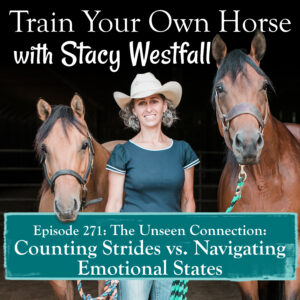Episode 271: The Unseen Connection: Counting Strides vs. Navigating Emotional States

In this episode, you’ll hear a conversation that perfectly illustrates the connection between what is going on in our mind, and how it is often reflected in our experience with our horse.
In this conversation, Kristen is struggling with riding transitions, specifically, ‘letting the horse go’ or riding bigger, and then transitioning back to collection.
Listen as Stacy asks questions to find the intersection of what is going on when riding, as well as what is going on in Kristin’s thinking. You’ll hear the breakthrough at the end of the conversation.
Also notice that specific physical riding advice is given,
BUT HERE IS THE PROBLEM: Counting strides won’t fix this issue, if the part that is happening in her THINKING isn’t addressed.
- emotions as vibrations
- getting stuck in a familiar emotional state
- why changing actions alone won’t work
- why change can feel awkward
- how this applies to fear, and recovering from accidents
The best news is that you can learn to transition between emotional states, and it will improve your riding.
SUBSCRIBE TO THE PODCAST HERE:





YOURS FREE
WHY IS MY HORSE...?

